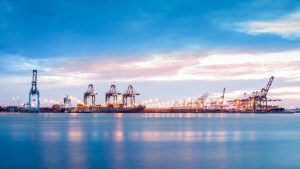Hybrid Marine Power: Growing Trend That Benefits the Environment & Your Bottom Line
 The future is now: Hybrid marine power and propulsion systems for workboats aren’t far-fetched. In fact, they may be essential.
The future is now: Hybrid marine power and propulsion systems for workboats aren’t far-fetched. In fact, they may be essential.
Manufacturers have begun shifting away from fossil fuels and utilizing hybrid marine power instead. New emissions laws have caused this shift, and manufacturers are becoming more aware of their impact on the environment.
Reducing the amount of pollution in the air and water can be a significant change for the maritime sector.
New Emissions Regulations
On January 1, 2015, emissions regulations banned certain types of vessels from entering ports around the world because of their diesel exhaust emissions.
Meeting Emissions Standards
 To avoid costly fines and meet emissions standards, manufacturers must utilize other fuel options.
To avoid costly fines and meet emissions standards, manufacturers must utilize other fuel options.
Liquid natural gas (LNG) has become a proven and viable source of ship propulsion to reduce emissions and meet standards. However, this approach doesn’t meet the needs of all ships. For this reason, some ship operators consider installing hybrid power systems alongside their diesel engines.
For some large ships and submarines, however, these types of innovative energy solutions have been ignored and not currently widely accepted. According to Marine News magazine, “These methods are viewed negatively as part of a complicated and costly compliance process.”
These solutions shouldn’t be considered as such and should be a proactive measure that will lead to more cost savings in the long run.
Types of Hybrid Marine Power Systems
There are two main types of hybrid system: serial and parallel. Find out more about the different types of hybrid systems to get a better understanding of what they do and the difference they make.
In a serial hybrid system, the engine powers a generator and isn’t mechanically connected to the propeller shaft. In a parallel hybrid system, the engine is connected, along with an electric “machine” that operates as both a propulsion motor and a generator.
Marine News magazine believes that “parallel systems are more likely to win initial market acceptance because of a perceived greater reliability, as the ‘trusted’ diesel engine is still connected to the propeller shaft with the electric propulsion adding a redundant system.”
Hybrid Systems Integrated in the Industry
Some have already begun to integrate these systems into their crafts, such as the European Union-funded project HYMAR (high-efficiency hybrid drivetrains for small- and medium-sized marine craft). While they initially set out to develop an optimized hybrid system, they concluded that parallel hybrid systems would better fit their needs. After executing this project, the parallel hybrid system was installed, tested, and validated on marine craft.
It’s crucial to consider hybrid power to save money for your company while also reducing emissions and benefiting the environment.
To see what CPV Manufacturing has to offer, click here to contact.

